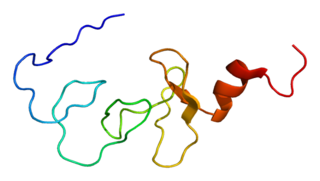Protein chibby homolog 1 is a protein that in humans is encoded by the CBY1 gene. [5] [6] [7]
Protein chibby homolog 1 is a protein that in humans is encoded by the CBY1 gene. [5] [6] [7]
Beta-catenin is a transcriptional activator and oncoprotein involved in the development of several cancers. The protein encoded by this gene interacts directly with the C-terminal region of beta-catenin, inhibiting oncogenic beta-catenin-mediated transcriptional activation by competing with transcription factors for binding to beta-catenin. Two transcript variants encoding different isoforms have been found for this gene. [7] CBY1 has also been shown to be important for ciliogenesis and is found at the transition zone of the cilium. [8]
CBY1 has been shown to interact with Beta-catenin. [9] CBY1 has also been shown to interact with CEP164, FAM92A1, and RAB8. [8]

BMP and activin membrane-bound inhibitor homolog , also known as BAMBI, is a protein which in humans is encoded by the BAMBI gene.

Beta-catenin-interacting protein 1 is a protein that is encoded in humans by the CTNNBIP1 gene.

Frizzled-5 is a protein that in humans is encoded by the FZD5 gene.

LIM domain kinase 2 is an enzyme that in humans is encoded by the LIMK2 gene.

Transcriptional regulator Kaiso is a protein that in humans is encoded by the ZBTB33 gene. This gene encodes a transcriptional regulator with bimodal DNA-binding specificity, which binds to methylated CGCG and also to the non-methylated consensus KAISO-binding site TCCTGCNA. The protein contains an N-terminal POZ/BTB domain and 3 C-terminal zinc finger motifs. It recruits the N-CoR repressor complex to promote histone deacetylation and the formation of repressive chromatin structures in target gene promoters. It may contribute to the repression of target genes of the Wnt signaling pathway, and may also activate transcription of a subset of target genes by the recruitment of catenin delta-2 (CTNND2). Its interaction with catenin delta-1 (CTNND1) inhibits binding to both methylated and non-methylated DNA. It also interacts directly with the nuclear import receptor Importin-α2, which may mediate nuclear import of this protein. Alternatively spliced transcript variants encoding the same protein have been identified.

Pescadillo homolog is a protein that in humans is encoded by the PES1 gene.

F-box only protein 7 is a protein that in humans is encoded by the FBXO7 gene. Mutations in FBXO7 have been associated with Parkinson's disease.

Nucleoporin 50 (Nup50) is a protein that in humans is encoded by the NUP50 gene.

Tubulin alpha-8 chain is a protein that in humans is encoded by the TUBA8 gene.

Eukaryotic translation initiation factor 3 subunit D (eIF3d) is a protein that in humans is encoded by the EIF3D gene.

Peroxisomal membrane protein PMP34 is a protein that in humans is encoded by the SLC25A17 gene.

Zinc finger protein 74 is a protein that in humans is encoded by the ZNF74 gene. Schizophrenia susceptibility has been associated with a mutation in this protein.

POZ-, AT hook-, and zinc finger-containing protein 1 is a protein that in humans is encoded by the PATZ1 gene.

Glycosyltransferase-like protein LARGE1 is an enzyme that in humans is encoded by the LARGE gene.

Probable tubulin polyglutamylase TTLL1 is an enzyme that in humans is encoded by the TTLL1 gene.

P2X purinoceptor 6 is a protein that in humans is encoded by the P2RX6 gene.

KN motif and ankyrin repeat domain-containing protein 1 is a protein that in humans is encoded by the KANK1 gene.

Dynein light chain 4, axonemal is a protein that in humans is encoded by the DNAL4 gene.

Testis-specific serine/threonine-protein kinase 2 is an enzyme that in humans is encoded by the TSSK2 gene.

Transmembrane protein 184B is a protein that in humans is encoded by the TMEM184B gene.